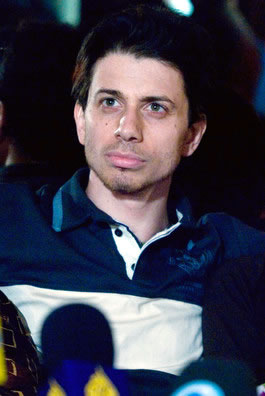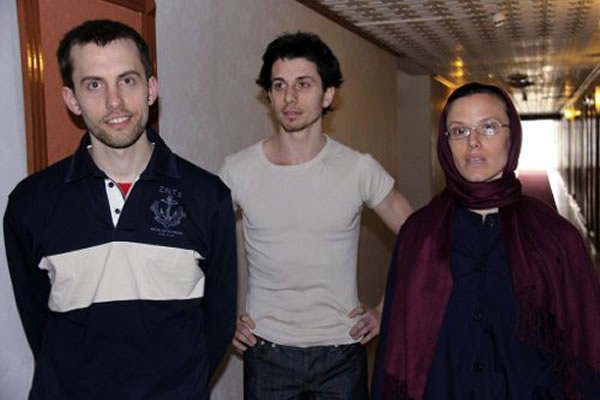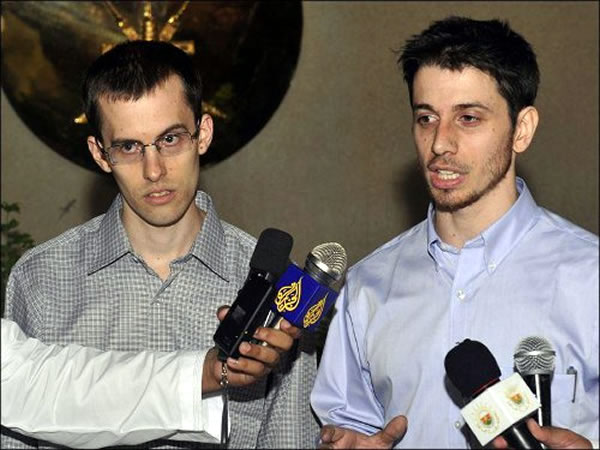
Solitary confinement in an Iranian prison was the worst experience of Josh Fattal’s life. It lasted the first four of 26 months he spent in captivity after mistakenly straying dangerously close to an unmarked border into Iran while hiking with two friends in Iraqi Kurdistan in July 2009.
He revisited the horror during a guest appearance at the Atlanta Jewish Film Festival in conjunction with a screening of “The Three Hikers,” a documentary that recounts the trio’s story.
Every day was a new challenge. I had no blueprint for survival.
“Every day was a new challenge. I had no blueprint for survival. When it comes down to it, it’s not really a question of physical survival as much as emotional survival,” Fattal says. “It was a matter of maintaining my sanity while being in solitary confinement, while trying to see the big picture.”

At 27, he turned to Jewish practice for comfort and sustenance in his cell, praying and observing the Sabbath – a practice he never had before. After a secular upbringing in the United States, he embraced his Jewish identity. “Jewishness put me in touch with my family and with a common history. That sense of belonging is exactly what is lacking in solitary.”
Fattal’s father, Jacob, emigrated from Iraq to Israel as a toddler in 1951. With tensions rising in the Middle East and Jews becoming displaced from Arab countries, his family reluctantly left their centuries-old homeland in what was for many a “second exile”. After growing up in Israel and serving in the army, Jacob moved to the United States. During Josh’s imprisonment in Iran, the family decided to keep those details private to help ensure his safety.
However, Josh Fattal says his captors knew the secret after the first week. He insists that his Jewishness did not affect his captivity and that he was treated the same as his non-Jewish friends.
After 30 days, the Americans were moved to Evin Prison in Tehran. Early on, Fattal declared a hunger strike and demanded to see his friends Shane Bauer and Sarah Shourd (Bauer’s girlfriend), also being kept in solitary confinement. Five days later, Iranian officials relented and let the three hikers share a meal. Then he tried another hunger strike to end the torture of solitary confinement. On the sixth night, Fattal’s captors promised he would see his friends, so he ate. But they reneged.
While Iran tried to pin the Americans as spies, Fattal drew on his sense of identity for emotional survival. As he explains, “I remembered who I was, where I came from, my family out there who loved me. It ultimately affirmed my Jewishness as part of me. For the first time in my life, I thought, ‘Why do I hold onto this Jewish identity?’ It came down to more of an emotional reason than a logical reason.”
He would have done anything for a voice to talk to. He occupied himself cleaning the floor of his cell, meditating, doing push-ups, juggling oranges, and trying to learn Arabic letters. For most of the time, he had a collection of books and a TV set. “My daily struggle was to stay human, to remember to feel, to remember to feel my body and emotions.”
Josh tries to remember the Hebrew alphabet. He teaches me the letters by writing them with sunflower seeds.
Companionship, at last, brought some happiness. After an initial meeting about 3½ months into their captivity, the three friends were allowed to visit every day in an open-air room. After four months, the guards put Bauer in a cell with Fattal, and the two remained together throughout the rest of their two-year ordeal. Recounting that time, Bauer, a journalist, wrote: “Josh tries to remember the Hebrew alphabet. He teaches me the letters by writing them with sunflower seeds. The task becomes stressful because we have to destroy the letters every time we hear footsteps, lest we give the guards ‘evidence’ that we are Israeli spies.”

Shourd was set free after 410 days of solitary confinement, without a trial or any evidence shown against her, in a move the three hikers believe was designed to ease international pressure against Iran.
The international spotlight – with pressure for their release from people like Desmond Tutu, Muhammad Ali and Sean Penn – shifted Fattal’s and Bauer’s status from ordinary prisoners to VIP prisoners.
Natalie Avital, “The Three Hikers” director, began filming in real time before their release. She interviewed anguished families and friends in America during the campaign to win the trio’s freedom.
Now a 33-year-old husband, father and doctoral student at New York University, Josh Fattal acknowledges her for helping others understand their experience. “I feel grateful to Natalie for making the film. She put in a lot of work to make it happen.”
After the screening, she and Fattal sit in director’s chairs on the theater stage and take questions. Every public event becomes easier for him, because more time has passed since the captivity in Iran. The audience remains quiet, attentive and compassionate. “We’re so glad you’re back,” one member says, and he seems to speak for all.
[Published on Aish.com, February 26, 2016]
